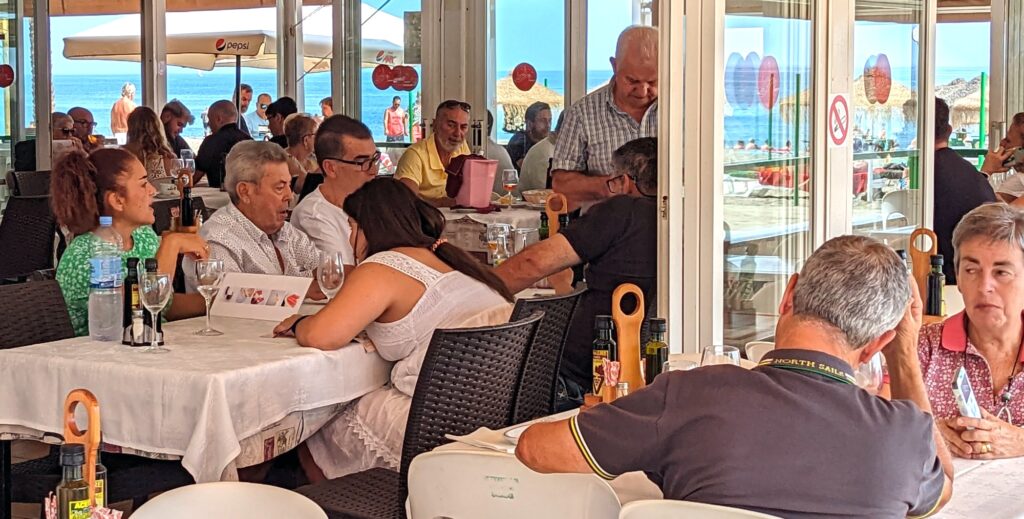
We sing the song of chiringuitos. They are the kitchens of summer along the Costa del Sol. When the sun shines and Spaniards and tourists alike bask in the light, chiringuitos are ready to feed you at the end of day.
Historically, a chiringuito was a casual beach bar, maybe even a makeshift operation. But from Marbella east to Málaga, they have evolved into permanent structures that line the beach. One of our favorites in Torremolinos is Restaurante Los Pescadores Playa (Paseo Marítimo Bajondillo, R5, Torremolinos; +34 95 205 83 37; lospescadoresplaya.es). The photo at the top of the post shows a slice of the indoor dining room at the midday meal on a Sunday. When we’re looking for a good restaurant for dinner, we always note which places are mobbed by Spaniards at lunch.
What the photo doesn’t show are all the outside tables behind the dining room stretching down to the beach where the chaise lounges and umbrellas are set up. Some beach bar — it seats about 150 people for dinner! To our minds, a good chiringuito combines all the best aspects of Spanish dining. It’s casual and inexpensive. (Entrées at Los Pescadores range from 9€-19€.) And the food could not be fresher.
Of fish and fire…
Los Pescadores advertises that the house specialty is ‶catch of the day,″ which is generally offered espeto. Most of the menu is actually set in tile, but the ‶catch″ is printed on paper. The whole fish — or in the case of octopus, whole tentacle — is impaled and grilled on the coals very much like the sardines in the last post. It’s a time-consuming way to cook, so be sure to order the full bottle of wine so you have something to sip while waiting. The list is strong on tart albariños from Galicia and juicy verdejos from Castilla-Léon.
One cook in the crew tends the fire in the metal rowboat filled with sand while he carefully roasts bream, sea bass, and red mullet on stakes next to the open bed of coals. He feeds the scraps to the semi-feral black and white cat who hangs out in the bushes. The finished fish have a crackly, almost paper-thin skin covering soft, moist flesh that flakes off the bones.
Here’s David’s dorado (gilt-head bream) from start to finish.

When the stinging winds from North Africa lash the coast intermittently from November until March, the chiniguitos close. Who would want to be on the beach in blowing sand — or worse, pelting rain? Even now, they operate on reduced hours because the tourists from northern Europe have gone home. But we dream of summer…. The chiringuitos all return by Holy Week.
